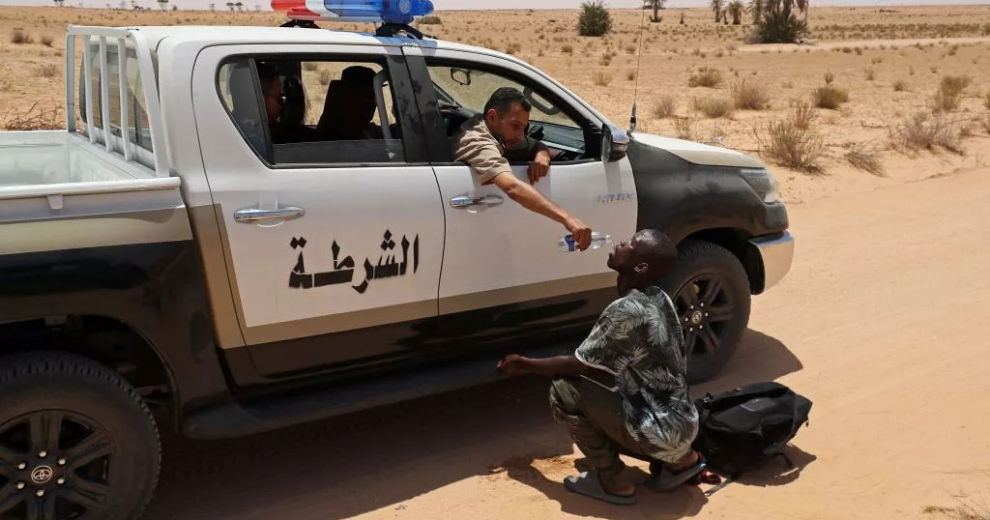Libyan border guards have rescued dozens of sub-Saharan migrants who, they say, were dumped by the Tunisian authorities in a desert area on the border between the two countries, and left without water, food or shelter, an AFP team observed on Sunday.
These journalists were able to photograph and film several groups of young men and a few women, visibly exhausted and thirsty, sitting or lying on the sand, trying to take shelter under scrawny shrubs, in temperatures exceeding 40 degrees.
Following clashes that claimed the life of a Tunisian on July 3, hundreds of African migrants were driven out of Sfax, Tunisia’s second largest city and the main departure point for illegal emigration to Europe.
According to NGOs, they were led by Tunisian police and abandoned to their fate in inhospitable areas near Libya to the east and Algeria to the west.
The migrants rescued by Libyan border guards were wandering in an uninhabited area near Al’Assah, around 150 km southwest of Tripoli and some 15 km inside Libyan territory.
“The number of migrants is increasing every day. Here, we have rescued between 50 and 70 migrants. We offer them medical care, first aid, considering the journey they have made through the desert,” Lieutenant Mohamad Abou Snenah, a member of a brigade that carries out border patrols, told AFP.
AFP was able to meet a group of women and children, including babies, welcomed into a center where they can be seen lying on mattresses or eating yoghurt.
– “Go to Libya” –
“They told us how they were mistreated by the Tunisian authorities and said they beat and tortured them,” continued the officer, pointing out that his brigade is “responsible for securing this stretch of the border”.
Abou Kouni, an Ivorian, told AFP that he arrived in Tunisia 7 years ago and was brutally stopped in the street in an unspecified town with his wife last week and loaded onto a truck.
According to him, the police “told them they were going to throw them into Libya”. When asked why, “they told me ‘we don’t need you in Tunisia'”, before taking away his and his wife’s phones.
Mr. Kouni told AFP that he had been “hit” on the torso and back, and that the police threatened to kill him.
“They put us in the desert and fired in our direction saying: +go to Libya+,” he said, pointing out that after a trek through the desert, they came across Libyan police who gave them water, food and medicine.
“I’ve been walking in the desert for two days. There are 30 other people on the other side. I don’t want to go back to Tunisia,” Moussa, a 20-year-old Malian, told AFP.
According to Tunisian NGOs, 100 to 150 people were still abandoned to their fate on Friday in desert areas on the border between Libya and Tunisia.
In previous days, the Tunisian Red Crescent had sheltered over 600 migrants, released after July 3 near the Libyan border post at Ras Jedir, 40 km north of Al’Assah.
Libya is home to at least 600,000 sub-Saharan migrants, and has been repeatedly accused by NGOs and international organizations of mistreating them.
Mr. Kouni told AFP that he had been “hit” on the torso and back, and that the police threatened to kill him.
“They put us in the desert and fired in our direction saying: +go to Libya+,” he said, pointing out that after a trek through the desert, they came across Libyan police who gave them water, food and medicine.
“I’ve been walking in the desert for two days. There are 30 other people on the other side. I don’t want to go back to Tunisia,” Moussa, a 20-year-old Malian, told AFP.
According to Tunisian NGOs, 100 to 150 people were still abandoned to their fate on Friday in desert areas on the border between Libya and Tunisia.
In previous days, the Tunisian Red Crescent had sheltered over 600 migrants, released after July 3 near the Libyan border post at Ras Jedir, 40 km north of Al’Assah.
Libya is home to at least 600,000 sub-Saharan migrants, and has been repeatedly accused by NGOs and international organizations of mistreating them.
Source : AFRICANEWS

















Add Comment